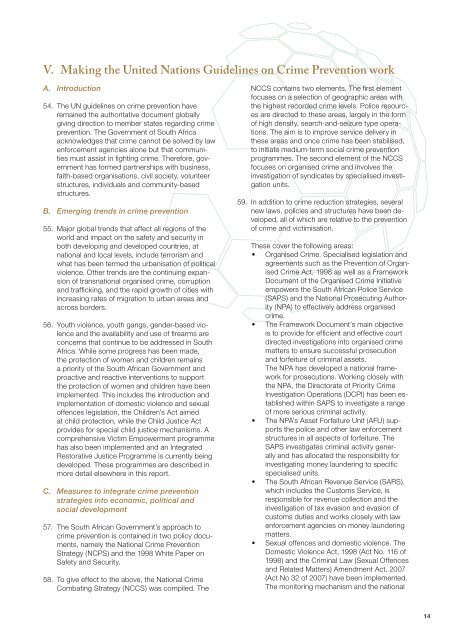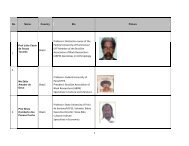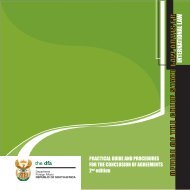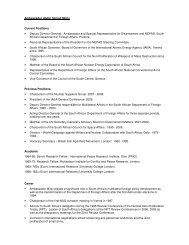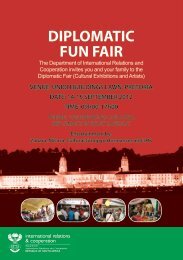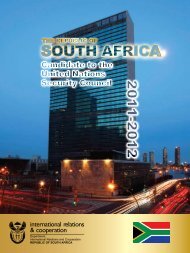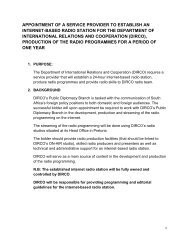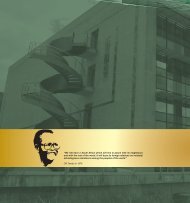Read more - Department of International Relations and Cooperation
Read more - Department of International Relations and Cooperation
Read more - Department of International Relations and Cooperation
Create successful ePaper yourself
Turn your PDF publications into a flip-book with our unique Google optimized e-Paper software.
V. Making the United Nations Guidelines on Crime Prevention work<br />
A. Introduction<br />
54. The UN guidelines on crime prevention have<br />
remained the authoritative document globally<br />
giving direction to member states regarding crime<br />
prevention. The Government <strong>of</strong> South Africa<br />
acknowledges that crime cannot be solved by law<br />
enforcement agencies alone but that communities<br />
must assist in fighting crime. Therefore, government<br />
has formed partnerships with business,<br />
faith-based organisations, civil society, volunteer<br />
structures, individuals <strong>and</strong> community-based<br />
structures.<br />
B. Emerging trends in crime prevention<br />
55. Major global trends that affect all regions <strong>of</strong> the<br />
world <strong>and</strong> impact on the safety <strong>and</strong> security in<br />
both developing <strong>and</strong> developed countries, at<br />
national <strong>and</strong> local levels, include terrorism <strong>and</strong><br />
what has been termed the urbanisation <strong>of</strong> political<br />
violence. Other trends are the continuing expansion<br />
<strong>of</strong> transnational organised crime, corruption<br />
<strong>and</strong> trafficking, <strong>and</strong> the rapid growth <strong>of</strong> cities with<br />
increasing rates <strong>of</strong> migration to urban areas <strong>and</strong><br />
across borders.<br />
56. Youth violence, youth gangs, gender-based violence<br />
<strong>and</strong> the availability <strong>and</strong> use <strong>of</strong> firearms are<br />
concerns that continue to be addressed in South<br />
Africa. While some progress has been made,<br />
the protection <strong>of</strong> women <strong>and</strong> children remains<br />
a priority <strong>of</strong> the South African Government <strong>and</strong><br />
proactive <strong>and</strong> reactive interventions to support<br />
the protection <strong>of</strong> women <strong>and</strong> children have been<br />
implemented. This includes the introduction <strong>and</strong><br />
implementation <strong>of</strong> domestic violence <strong>and</strong> sexual<br />
<strong>of</strong>fences legislation, the Children’s Act aimed<br />
at child protection, while the Child Justice Act<br />
provides for special child justice mechanisms. A<br />
comprehensive Victim Empowerment programme<br />
has also been implemented <strong>and</strong> an Integrated<br />
Restorative Justice Programme is currently being<br />
developed. These programmes are described in<br />
<strong>more</strong> detail elsewhere in this report.<br />
C. Measures to integrate crime prevention<br />
strategies into economic, political <strong>and</strong><br />
social development<br />
57. The South African Government’s approach to<br />
crime prevention is contained in two policy documents,<br />
namely the National Crime Prevention<br />
Strategy (NCPS) <strong>and</strong> the 1998 White Paper on<br />
Safety <strong>and</strong> Security.<br />
58. To give effect to the above, the National Crime<br />
Combating Strategy (NCCS) was compiled. The<br />
NCCS contains two elements. The first element<br />
focuses on a selection <strong>of</strong> geographic areas with<br />
the highest recorded crime levels. Police resources<br />
are directed to these areas, largely in the form<br />
<strong>of</strong> high density, search-<strong>and</strong>-seizure type operations.<br />
The aim is to improve service delivery in<br />
these areas <strong>and</strong> once crime has been stabilised,<br />
to initiate medium-term social crime prevention<br />
programmes. The second element <strong>of</strong> the NCCS<br />
focuses on organised crime <strong>and</strong> involves the<br />
investigation <strong>of</strong> syndicates by specialised investigation<br />
units.<br />
59. In addition to crime reduction strategies, several<br />
new laws, policies <strong>and</strong> structures have been developed,<br />
all <strong>of</strong> which are relative to the prevention<br />
<strong>of</strong> crime <strong>and</strong> victimisation.<br />
These cover the following areas:<br />
• Organised Crime. Specialised legislation <strong>and</strong><br />
agreements such as the Prevention <strong>of</strong> Organised<br />
Crime Act, 1998 as well as a Framework<br />
Document <strong>of</strong> the Organised Crime Initiative<br />
empowers the South African Police Service<br />
(SAPS) <strong>and</strong> the National Prosecuting Authority<br />
(NPA) to effectively address organised<br />
crime.<br />
• The Framework Document’s main objective<br />
is to provide for efficient <strong>and</strong> effective court<br />
directed investigations into organised crime<br />
matters to ensure successful prosecution<br />
<strong>and</strong> forfeiture <strong>of</strong> criminal assets.<br />
The NPA has developed a national framework<br />
for prosecutions. Working closely with<br />
the NPA, the Directorate <strong>of</strong> Priority Crime<br />
Investigation Operations (DCPI) has been established<br />
within SAPS to investigate a range<br />
<strong>of</strong> <strong>more</strong> serious criminal activity.<br />
• The NPA’s Asset Forfeiture Unit (AFU) supports<br />
the police <strong>and</strong> other law enforcement<br />
structures in all aspects <strong>of</strong> forfeiture. The<br />
SAPS investigates criminal activity generally<br />
<strong>and</strong> has allocated the responsibility for<br />
investigating money laundering to specific<br />
specialised units.<br />
• The South African Revenue Service (SARS),<br />
which includes the Customs Service, is<br />
responsible for revenue collection <strong>and</strong> the<br />
investigation <strong>of</strong> tax evasion <strong>and</strong> evasion <strong>of</strong><br />
customs duties <strong>and</strong> works closely with law<br />
enforcement agencies on money laundering<br />
matters.<br />
• Sexual <strong>of</strong>fences <strong>and</strong> domestic violence. The<br />
Domestic Violence Act, 1998 (Act No. 116 <strong>of</strong><br />
1998) <strong>and</strong> the Criminal Law (Sexual Offences<br />
<strong>and</strong> Related Matters) Amendment Act, 2007<br />
(Act No 32 <strong>of</strong> 2007) have been implemented.<br />
The monitoring mechanism <strong>and</strong> the national<br />
14


